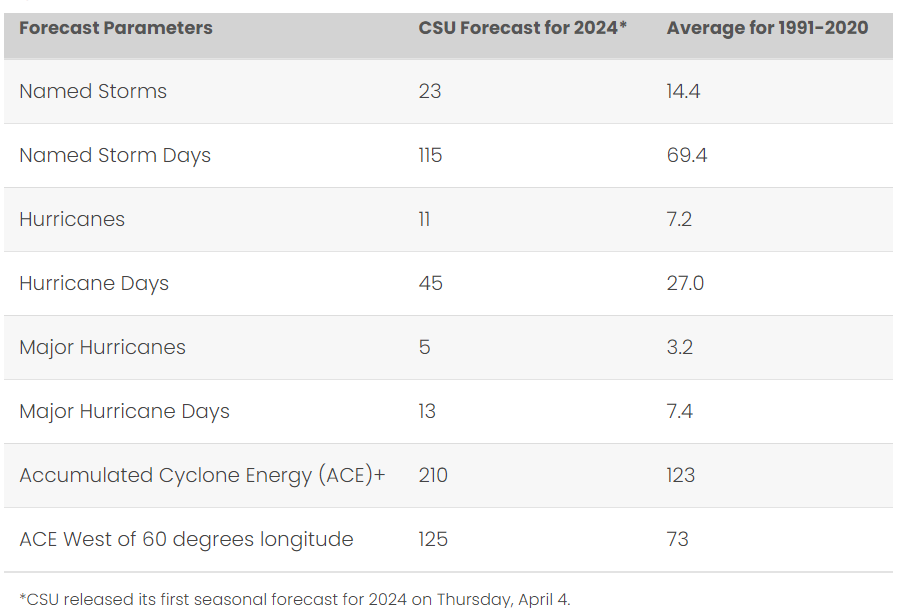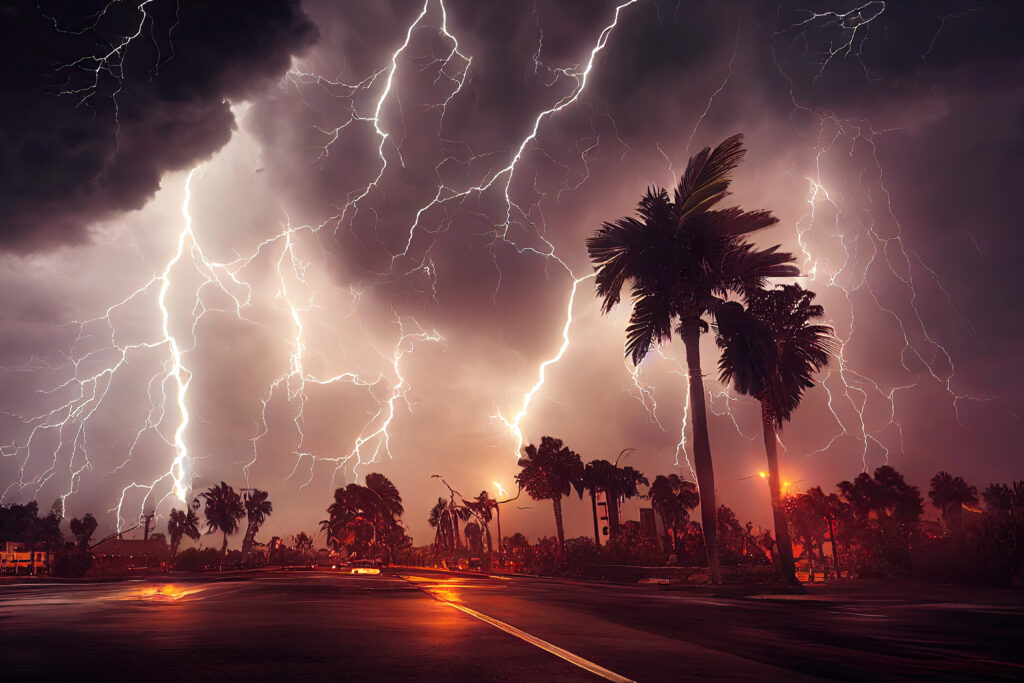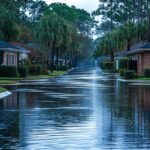Weather, global warming, and real estate make an unlikely trio, but they go hand-in-hand, nonetheless.
This year, as they have done for decades, the Tropical Weather and Climate Research Team at Colorado State University (CSU) makes predictions on the upcoming seasonal Atlantic Basin hurricane season which runs from June 1 to Nov 30 every year. (For the purposes of this report, we are only discussing the Atlantic hurricane season, the Eastern North Pacific and the Central North Pacific, both also tracked by the National Hurricane Center by the National Oceanic Atmospheric Administration, are not being included in this report).

This year, CSU is predicting 23 named tropical storms (tropical depressions do not get names, only numbers. Tropical storms get names after organized winds reach a minimum of 39 mph).
This number is almost 60% higher than seasonal averages from 1991-2020 of 14.4 named storms. Of these storms, CSU predicts that 11 will develop into hurricanes (which transform from tropical storms to hurricanes when they reach windspeeds of 74 mph), and five will become major hurricanes — Category 3 (wind speeds 111-129mph), 4 (130-156 mph), or 5 (157+ mph) on the Saffir-Simpson Hurricane Wind Scale.
By comparison, none of the last three hurricane seasons have seen as many as 23 named storms. The last year with as many storms was 2020, which tied with 2005 as the worst hurricane season on record. In other words, 2024 is set up to potentially become either the second-worst or worst hurricane season on record. In fact, this is the highest-ever hurricane prediction that CSU has ever issued.
CSU researchers—who have been releasing annual hurricane forecasts since 1984—say they have above-average confidence in this April outlook. While there’s still plenty of time for conditions to shift before the hurricane season starts on June 1, it’s best to prepare now for an extremely active season.
All-in-all, the 2024 hurricane season will most likely be the most active since the last record-setting forecast in 2020 and will likely exceed even those numbers.

Hurricane season will likely be most severe along the Gulf Coast, in states like Texas, Louisiana, Mississippi and Alabama. Compared to the historical average landfall probability of 27%, CSU researchers predict that the Gulf Coast has a 42% chance of landfall during the 2024 hurricane season. The East Coast from the Florida peninsula north has a 34% chance of landfall in 2024. For a more granular look, you can estimate the hurricane risk associated with your area using FEMA’s National Risk Index.

The severity of hurricane season doesn’t just depend on where hurricanes make landfall—it also depends on the strength of the built environment. Researchers at the Insurance Institute for Business and Home Safety (IBHS) recently released the 2024 Rating the States Hurricane Coast report, which found serious shortcomings in building codes in hurricane-prone states like Texas, Mississippi, and Alabama.
“Building codes are an absolutely vital tool in keeping communities healthy and resilient,” says Dr. Anne Cope, chief engineer at IBHS. “We see a direct correlation between mortgage delinquency rates after landfalling hurricanes and a lack of building code.”
To check the local building code in your area, head to InspectToProtect.org and type in your address or ZIP code to see how well your local building code may protect against hurricane season. And if your area’s building code is weak? “Get noisy,” Cope says. She points to Mobile and Baldwin Counties in Alabama, where a grassroots movement following Hurricane Katrina led to the adoption of more robust building code than the rest of the state, which got a failing grade in this year’s study.
As with all forecasts, things change, especially atmospheric conditions (wind shear and the Saharan Dust that blows across the ocean into the Atlantic Basin are banes to hurricane development) so CSU updates their forecast three times throughout the tropical season on June 11, July 9, and Aug 6.
Hurricanes and housing: Commentary from Bankrate Analyst Shannon Martin
Following the announcement from CSU, Bankrate Analyst Shannon Martin commented on the predictions, as well as her advice for homeowners in areas likely to be impacted during hurricane season.
“Along with a more active hurricane season, the NOAA anticipates this summer to be even hotter than last year. Homeowners in Gulf Coast states like Texas and Louisiana should be proactive with their hurricane preparations and buy portable air conditioners and small generators ahead of hurricane-related power outages,” Martin said. “More people died from extreme heat than from most other natural disasters combined and the elderly and very young populations are particularly vulnerable.”
“There is still time to speak with your agent about any potential insurance gaps on your homeowners policy. The National Flood Insurance Program (NFIP) has a 30-day waiting period before coverage kicks in, but many private flood insurers can start coverage in less than seven days. You will want to start the process before hurricane season is in full swing.”
“We often think of how hurricanes can damage our homes, but our cars are just as vulnerable. Comprehensive coverage tends to be surprisingly affordable and helps pay for damage related to natural disasters such as flooding, extreme wind and wildfire. Once a storm is named, most insurance companies put all policies in affected states on a moratorium until the storm passes. If you want to add comprehensive coverage or decrease your deductible, now is the time.”
“Most home insurance policies include a condition requiring homeowners to conduct reasonable repairs to help mitigate further loss if the home experiences damage. After catastrophic disasters, many homeowners experience price gouging on necessities like water, plywood and roof tarps, so stocking up on supplies ahead of time can save you money and stress.”
“Natural disasters invite opportunists and fraudsters at a time when people are the most vulnerable. Whether you need to evacuate or plan to stay in town to ride out the storm, save the contact and claim information for your insurance company and a trusted contractor in your phone. Make sure you know you are speaking with a legitimate insurance representative before disclosing private information or signing any documents.”
Click here to see CSU’s forecast. For the official government forecast from NOAA’s National Hurricane Center, click here.








